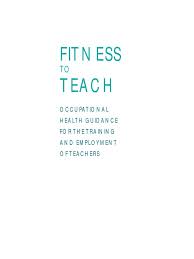Introduction
As education providers, ensuring the quality and professionalism of teaching staff is an essential responsibility. One important aspect of this duty is assessing the fitness to teach of employees as it reflects on the safety and well-being of students as well as the institution’s reputation. This article aims to provide a clear understanding of the term ‘fitness to teach’ and offers a comprehensive guide that outlines legal requirements and considerations for education providers.
Understanding “Fitness to Teach”
Fitness to teach refers to a measure of a teacher’s professional and personal suitability for their role in educating children or young people. The concept encompasses various criteria including qualification, competence, and character. The primary focus is on maintaining standards and values that guarantee safe learning environments for students while upholding teaching quality for successful educational outcomes.
Legal Requirements
Education providers must adhere to specific laws and regulations when employing teachers or assessing their fitness to teach. The following legal frameworks govern hiring practices, conduct, capability, and disciplinary issues involving teachers:
1. The Education (School Teachers’ Qualifications) Regulations: These regulations outline minimum academic requirements for qualified teacher status (QTS), which is a prerequisite for those teaching in public schools.
2. The Independent School Standards: Both independent schools and non-maintained special schools must comply with these standards, which require appropriate checks on teachers’ qualifications, health, and suitability before employment.
3. General Teaching Council (GTC) Codes: In jurisdictions with active GTCs, education providers should observe professional standards set by the GTC Codes outlining conduct expectations.
Assessing Fitness to Teach
Education providers should establish robust procedures when determining a prospective or current teacher’s fitness for their role. Considerations in assessing fitness include:
1. Qualifications: Ensuring the teacher possesses relevant academic qualifications or QTS necessary for their position.
2. Disclosure & Barring Service (DBS) checks: Carrying out thorough background checks to identify any criminal convictions or related matters, which could influence the teacher’s fitness to teach.
3. Health: Verifying mental and physical health status that would not interfere with the teacher’s ability to perform their job effectively or compromise students’ safety.
4. Professional Competence: Ensuring teachers demonstrate appropriate teaching skills, knowledge, and experience, with ongoing professional development to continuously improve practice.
5. Character: Evaluating a teacher’s character based on past experiences, integrity, professionalism, and attitude towards responsibilities.
6. References: Collecting reliable references from previous employers verifying competencies, skills, and attitudes demonstrated in similar roles.
Addressing Unfitness – Procedures and Interventions
In cases where a teacher’s fitness may be questionable or compromised before or during employment, education providers should implement transparent processes in line with developmental and disciplinary policies. These steps may involve:
1. Performance management strategies for teachers facing competence-related issues.
2. Professional development programs designed to strengthen teaching skills.
3. Occupational health and medical interventions for teachers struggling with health-related issues.
4. Disciplinary action in cases of serious breaches related to professional conduct or character.
Conclusion
Education providers must prioritize maintaining standards of fitness amongst teaching staff for the benefit of all parties—and that begins by understanding the legal frameworks governing fitness to teach. Regularly evaluating the suitability of teaching staff ensures not only the safeguarding of students but also demonstrates a commitment to upholding educational quality and institutional integrity.





